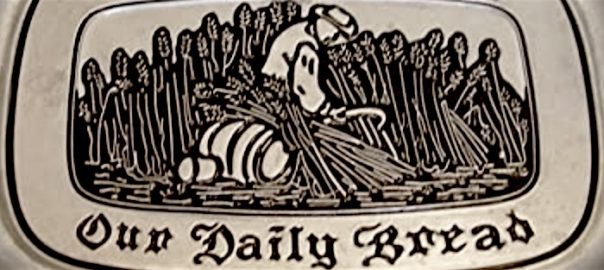
The Lord’s Prayer, found in Matthew, Mark, and Luke’s Gospels, is a central part of every Christian tradition. Its beauty and brevity, breadth and depth, welcomes our humble devotion, bold petition, transformative forgiveness, and alertness to the spiritual battle waging within and around us.
Right after the opening phrases of submission to God’s sovereignty and welcoming his reign in all of life, comes a simple petition: “Give us this day our daily bread…” For first century believers and most people since, this is not a casual phrase, but a real plea for provision for oneself and her or his family. Many people throughout most of history have spent their time laboring for daily bread. This prayer includes pleas for rain in season and a good harvest, wages paid to laborers, and a host of connected circumstances that allow life for another day or year.
In our 21st century globalizing world, this prayer is a cry for economic justice, a plea for all the systems of local and global economies to function so that we can flourish. In the last half century, two to three billion people have come out of abject poverty because of access to global markets and systemic and technological transformations that connect us as never before. In fact, in 2020, the United Nations declared for the first time in human history more people were above the line of abject poverty than below the line.
These heartening developments must not allow us to ignore the pressing needs of so many mired in despair and destitution. Whether it is rural or urban poverty in the West (with so many food deserts just minutes away from abundance), famine and pestilence in global locales, or warfare raging around the world, there is much to do for all concerned with justice.
What this plea implies
When we pray, “Give us this day our daily bread,” we acknowledge the Lord as our source. We are also praying for all the people and systems to function in order to be sustained in our physical and social lives. Bread literally requires a global/local community: farmers, millers, co-operative grain storage and distribution, bakers, distributors, and retailers. Of course, in some locales sources and sales are simplified, but the principle is the same: It truly takes a community for our daily bread.
If we expand “bread” to refer to all the needs that sustain our physical lives (and therefore our social welfare as well), this petition takes on broader implications. We are praying for systemic access, equity, and opportunity for all to flourish. We are praying for those with bread to share it with the hungry (Is 58; 1 John 2-4). We are praying for just conditions for all that are engaged in the exchanges that bring us our products. We are praying for justice. We are not praying for a particular political ideology, but for private and public, personal and social to integrate well according to the precepts and wisdom found in the Scriptures, including gleaning laws and generosity, personal responsibility and community concern for the marginalized.
“Give us this day our daily bread.” We serve a God offering abundance (John 10:10). We serve a God who can meet all our needs and more (Luke 6:38; Eph 3:20-21). We serve a God who answers the needy of others through the sacrificial generosity of others, even folks far away (Acts 15; 2 Cor 8-9). When we voice this prayer, we are committing to action on behalf of the voiceless.
May this prayer continue echoing from prayer rooms and churches, private devotions and public spaces until Jesus returns. And may it stimulate generosity, new relationships, economic and social reforms leading to the table of abundance for all.

